Keeping Your Pet Safe In The Garden
Your garden probably contains a few hidden dangers that can injure or poison your pet. Find out how you can keep them safe outside this spring.

Keeping your dog and cat safe outdoors
The start of spring signals better weather, longer days and hopefully more time spent in the garden for you and your pet. Whether you’re planning to get back into gardening, or you’re just spending a little more time outside, you’ll need to be aware of some of the toxins and tools that could pose a risk to your pet.
Bee and wasp stings in dogs and cats
Bees and wasps start to reappear as the weather warms up, and it’s highly likely that your pet will get stung at some point in their life. Dogs are the most common pet to be stung by bees and wasps, due to their playful and inquisitive nature. Most of the time, a sting will only cause minor pain and irritation so you may not need to visit your vet. Don’t try to pick out the sting with tweezers, as this can squeeze more venom out. Instead, use a rigid piece of card to gently scrape the stinger away. Wrap an ice pack in a towel and apply to the area to reduce swelling and ease the pain.
However, if your pet is stung several times inside the mouth or throat it can be serious and requires an immediate trip to your vet. They may also have a severe allergic reaction to the chemicals in the sting.
Symptoms of an allergic reaction to wasp and bee stings in pets include:
- General weakness
- Difficulty breathing
- Excessive swelling
If you think your pet is having an allergic reaction, contact your local vet immediately, as the swelling can block the airway.
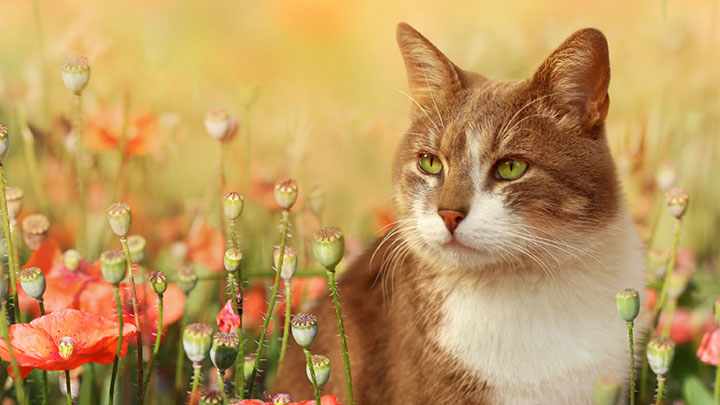
Garden tools dangerous to cats and dogs
Spring is an important time for any keen gardener. If you’re tackling some of the bigger jobs, such as mowing the lawn or trimming hedges, it’s a good idea to keep your pet inside.
It’s worth remembering that common garden tools, including lawnmowers, strimmers, secateurs, loppers and chainsaws, are extremely dangerous and should never be used around pets. In fact, the loud noises that garden machinery creates can cause stress in many pets, particularly cats.
If you have a vegetable patch and use compost, your compost heap will be full of bacteria that can be dangerous for pets, so make sure it’s properly fenced off to keep them safe. You may even want to build a barrier around your allotment or vegetable patch to make sure your pet doesn’t venture in.
Garden plants poisonous to dogs and cats
Spring bulbs are toxic to pets
Many spring bulbs are toxic to pets, causing vomiting, diarrhoea, excessive drooling, disorientation and even heart problems.
These toxic bulbs include:
- Daffodils
- Lilies
- Tulips
- Bluebells
- Hyacinths
- Narcissus
It’s always safest to avoid planting these flowers in your garden or having them in your home. Whilst toxic poisoning caused by bulbs is fortunately rare, our vets do see an increase in dogs with an upset stomach after nibbling on garden bulbs.
If you suspect your pet has eaten a toxic bulb or plant, contact your local vet immediately.
Chemicals and poisons dangerous to pets
There are lots of toxins in the garden and shed and garage. These can be hazardous to your pet if swallowed, so always make sure you secure the lids of gardening products and store them above ground level.
Slug killer
Slug killer contains toxic metaldehyde, which causes tremors, fits and twitching that can go on for several days.
Fertiliser
Fertiliser can contain additives that are toxic to pets, causing vomiting, diarrhoea and collapse if eaten in large quantities. Safer pet-friendly fertiliser is available, but you should still always store it out of paw’s reach.
Rat poison
Rat poison affects the body’s ability to clot blood, resulting in excessive bleeding. Symptoms include weakness, lameness, bruising and vomiting.
Weed killer
Weed killer varies dramatically, but can cause dehydration, bloody vomiting, breathing and heart issues, mouth ulcers and kidney and liver failure.
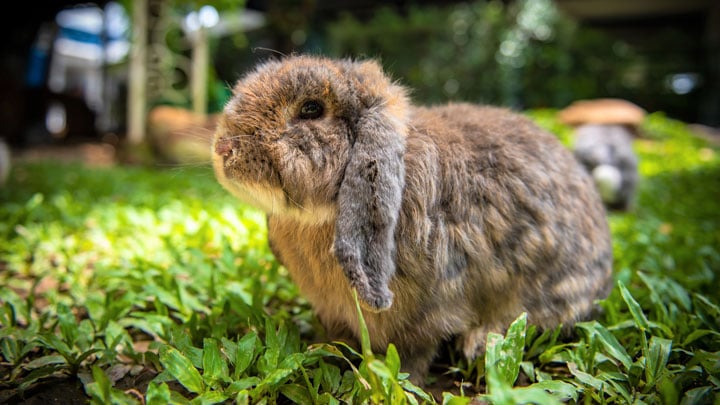
Pet allergies
Much like humans, pets can suffer allergic reactions to various plants, pollen and insects. These allergies can cause hay fever-type symptoms of itchy, watery eyes, sneezing, congestion and a sore throat. They can also cause rashes and itchy skin which can lead to excessive scratching, hair loss and infection.
Your pet can develop allergies at any point in their life, so it’s always worth keeping an eye out for any of the above symptoms. Certain dog breeds can also be more susceptible to skin allergies, including Boston Terriers and English Bulldogs.
If your pet develops an allergy, ask your vet for advice on how to identify the cause and ease their symptoms.
Lastly, always ensure your pet is fully vaccinated.
Spring Garden FAQS
Puppies should not go outside or mix with other dogs until they have had their second vaccination and have an adequate level of protection. Some diseases can be spread by wild animals such as rats and foxes, who may walk in your garden, so it is safest to keep your puppy in until they are protected.
Try not to leave your dog unintended or consider fencing off the planted area so your pet cannot eat them.
Yes, the green part of the tomato plant is toxic to dogs as it is part of the nightshade family. Red, ripe tomatoes are not toxic but can cause stomach upset.
There will some who claim that certain types of plants are deterrents to dogs, however this is not certain. If you are concerned about your dog eating an unfriendly plant, its always best to keep to pet safe plants in your garden. You can check our poisons list for more information.
Only put in pet-safe plants (you can check these in our poisons guide), remove any thorny bushes such as brambles and avoid leaving your pet unattended for long periods of time in the garden which may lead to them over-exploring or garden destruction. Check that any chemicals you use in the garden are pet-safe and put your pet inside when using sharp tools such as strimmers and mowers.
Daffodils are a common spring flower which is poisonous to dogs and cats if consumed or they drink the water they are in. Lots of bulbs and seeds can be toxic to dogs so make sure you keep dogs off freshly sown areas. Check our poisons guide to make sure your plants and flowers are safe for pets.
Related Articles
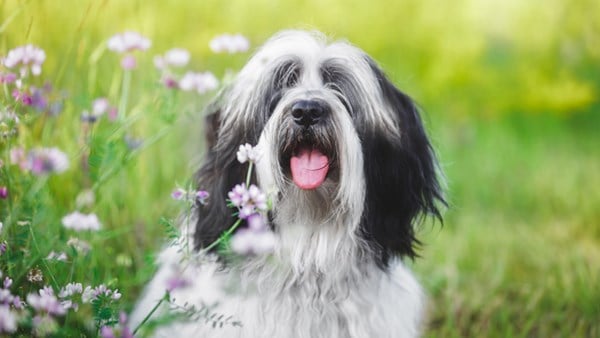
Toxic Bulbs To Be Aware Of
Some Spring bulbs and flowers are harmful to dogs – so keep an eye on your pooch, particularly if they enjoy digging.
Read article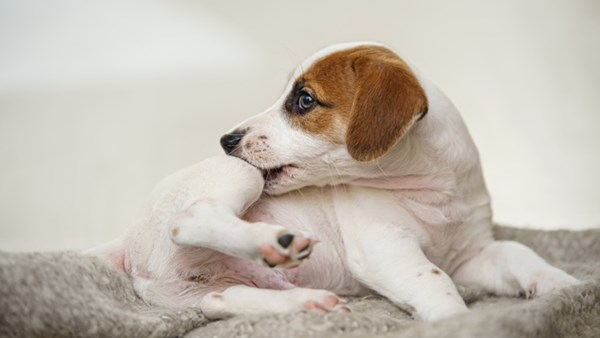
Atopic Dermatitis In Dogs And Cats
As one of the most common skin allergies, atopy affects a huge number of pets. Learn how to spot and treat it.
Read article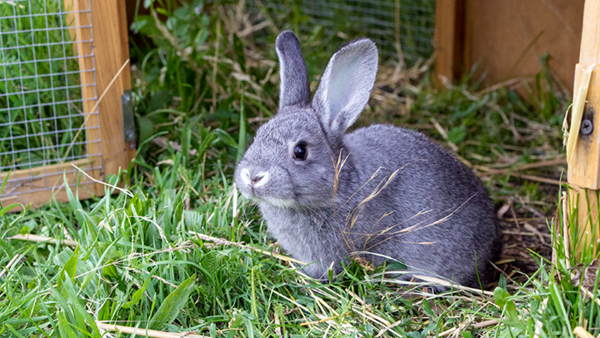
Rabbits And Myxomatosis
Vaccinate your rabbit every 12 months to protect them against contracting Myxomatosis.
Read article
